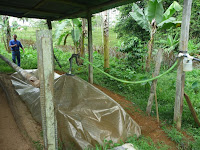
It´s pretty rural. Here´s the view from the kitchen window:
 One of the volunteer´s main projects is an internet cafe. He raised $4000 to buy 8 computers, software, desks, wiring, backup batteries, and a printer, and uses a free satellite uplink provided by the government:
One of the volunteer´s main projects is an internet cafe. He raised $4000 to buy 8 computers, software, desks, wiring, backup batteries, and a printer, and uses a free satellite uplink provided by the government: He teaches computer classes and has trained a few kids to run the cafe and teach their own classes. A lot of the classes include activities in Excel and Word which ask kids to be creative, reflect on their experiences, read, and write, so the class becomes a way to teach a lot of different things. The kids who help administer the cafe are learning entrepreneurial, teaching, leadership, and communications skills. Sometimes it´s easiest to teach kids because they have free time and nothing to loose.
He teaches computer classes and has trained a few kids to run the cafe and teach their own classes. A lot of the classes include activities in Excel and Word which ask kids to be creative, reflect on their experiences, read, and write, so the class becomes a way to teach a lot of different things. The kids who help administer the cafe are learning entrepreneurial, teaching, leadership, and communications skills. Sometimes it´s easiest to teach kids because they have free time and nothing to loose.Classes for adults have their own advantages, though: you can teach accounting and other business skills, and you can connect people to far-away resources, like helping farmers to communicate with the Ministry of Agriculture and take advantage of programs which give away better seeds.
On a seperate note for the biologically, chemically, or environmentally inclined, here´s a picture of a nearby ¨biodigester.¨ Waste from the pigpen goes in one end, slightly cleaner water comes out the far end, and in the middle anaerobic bacteria produce a lot of methane, which fills up the bag, connects to your house through the hose, and powers your stove. Now that´s cooking with gas!

As my host put it, Costa Rica is a developed enough country that Peace Corps projects aren´t just about helping people to survive. They´re about figuring out better ways to live.


Fascinating. What becomes of the "slightly cleaner" water which is dispensed at the far end of the "biodigester"?
ReplyDeleteWaste water from the biodigestor contains a lot of nitrogen, so they use it for watering and fertilizing plants. It´s not entirely clean, though, so they only use it for bushes and trees (where it won´t touch the fruit) and never for leafy vegetables like lettuce.
ReplyDeleteIt's so cool Alex. I lived there and the experience that you are having is completely different from mine - como dos Costa Ricas. I love your take on everything!
ReplyDelete